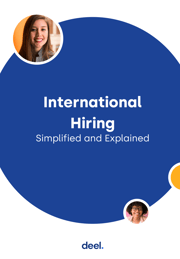
When Should You Move from Contractors to Full-Time Employees?

Key takeaways
- Small businesses and startups often choose to hire independent contractors because they're typically more affordable than full-time employees.
- Companies that want to scale or need funding from investors usually opt for full-time employees for team stability and more control over the workforce.
- As you scale and your business priorities and budget change, you can convert your contractors into employees.
Growth is exciting—whether you’re talent hunting across the globe to scale your team or expanding into a new and untapped market.
To ensure success, there’s one thing you need to do right: choose knowledgeable team members who share your vision and mission, no matter where they’re located. After you do all this hard work searching for the best talent that fits into your company culture, you may find yourself stuck deciding what’s the right way to hire that talent because you lack the knowledge to handle the intricacies of international hiring.
This guide will help you determine if working with foreign independent contractors is the right option for you or it’s time to hire full-time workers—through an employer of record.

The eternal question: independent contractors or full-time employees?
Businesses worldwide struggle to determine whether they should hire full-time employees or independent contractors. Both options have their pros and cons: independent contractors are cost-effective and can cover a fluctuating workload without extensive training and onboarding. On the other hand, full-time employees allow you to build a steadier workforce to which you can offer competitive benefits if you want to retain them.
Now, the answer to who you should hire seems simple, but the decision gets more complicated when you throw global hiring into the mix.
When working with foreign independent contractors, you deal with invoices and foreign currencies, but when hiring full-time workers, there are a few more things to bear in mind. For instance, local employment laws regarding employment status, mandatory employee benefits, and other compliance matters.
|
|
|
|
|
Works for an employer |
Business relationship |
Works with one or more client companies |
|
Works according to company-regulated schedule |
Schedule |
Sets their hours |
|
Receives tools or reimbursements from employer |
Tools necessary for work |
Has their own tools and covers any business expenses |
|
Receives employer-provided onboarding and training |
Training |
Comes with skills and expertise and needs little to no training |
|
Shares taxes with the employer and has taxes withheld from gross pay |
Taxes |
Pays self-employment taxes |
|
Files W-2, W-4 |
Tax forms |
Files W-9, W-8, 1099s |
|
Receives benefits like health insurance and retirement contributions |
Mandatory benefits |
Doesn’t receive any employment benefits or Fair Labor Standards Act (FLSA) protections |
|
Receives regular, fixed payments |
Compensation |
Receives hourly or project-based wages |
|
Gets direct supervision from a manager |
Employer supervision |
Receives minimal supervision and controls their own process |
Let’s take a closer look at various scenarios in which you might need independent contractors, and when hiring full-time workers through an employer of record is a better idea.
What is an independent contractor?
An independent contractor is a worker who’s not on your payroll but acts as an external collaborator. Independent contractors organize their own working schedules and typically work on long-term and short-term projects. They don’t have employers, but clients.
Many companies prefer working with foreign independent contractors because contractors from other countries can bring fresh perspective and diverse expertise to the team. Also, hiring independent contractors from countries with a lower cost of living means a significant reduction in expenses for the company.

When should you hire foreign independent contractors?
If you hire a full-time account executive in Brazil with an annual salary of around $27,000 USD, your total employer costs may go up to $38,000 USD once you include mandatory employee benefits and taxes. When you hire an independent contractor, you are not obliged to cover for the taxes and benefits.
If these scenarios apply to you, it might make sense to hire independent contractors:
- You have a fluctuating workload
- You’ve just started a business
- You want to run as little risk as possible
You have a fluctuating workload
Working with independent contractors allows you to have the right amount of people at the right time without the additional operational workload of employee onboarding and termination.
Companies that have a seasonal business don’t need the same level of support year-round. For instance, you may need software developers for a one-off project, but don’t usually need this role on your team permanently. By hiring an independent contractor, you can bring on the number of support workers you need for a shorter period of time until you complete the project.
You've just started a business
Startups often operate with limited budgets and need as much expertise as possible to get the business going. That can mean that, at the initial phase, startups can’t afford to hire full-time employees and pay their taxes and contributions.
In that case, working with independent contractors who already have their own equipment, don’t need training, and aren’t entitled to employee benefits is a more affordable option.
Moreover, if you face hypergrowth, you can onboard independent contractors much faster than full-time employees.
Alex Bouaziz, Co-founder and CEO , Deel
You want to run as little risk as possible
Hiring independent contractors is less risky as you have fewer legal responsibilities in terms of taxes, contract termination, and severance pay.
If you run a small business or a startup, the future of your company may seem uncertain. If the outcome of your efforts is unfavorable, you may struggle to pay your team’s salaries, severance pay, and meet the termination conditions from the contracts. When working with independent contractors, it’s easier to end the collaboration if things don’t go well. Also, you can always offer to convert your contractors into full-time employees if your business grows as planned.
At some point, your business needs may outgrow working with contractors. One of the fastest and simplest options to hire full-time employees from other countries is hiring through an employer of record.
Mark Hanson, CTO, Decoderd Health
What is an employer of record?
An employer of record is an organization that acts as a legal employer of your full-time workers from other countries. The EOR carries all legal responsibility for your foreign workers, managing their contracts, onboarding, salary, employee benefits, taxes, background checks, and termination. At the same time, you still remain in charge of the employees’ day-to-day tasks and workload.
Employers of record facilitate global hiring—ensuring you, as their client company, don’t run any compliance risks when hiring from foreign countries. The EOR’s legal team creates locally compliant contracts for each country you hire from and administers statutory employee benefits and legal requirements, such as minimum wage or paid time off.
Some employers of record like Deel also offer independent contractor management through the platform, so it’s easy to manage an entire global team from one central interface.
Steve Hoffman, Senior Strategic Partnerships Manager, Deel
When should you hire full-time employees through an employer of record?
If you’re building for the long-term, hiring full-time employees through an EOR can bring more benefits than from working with contractors.
- You need financial support from investors
- You want to attract talent with employee benefits and perks
- You want more data security through company-provided equipment
- You want intellectual property ownership
You need financial support from investors
Funding series are often drivers of companies’ decisions to hire full-time employees. To increase the value of your company and build a case in front of potential investors, it’s crucial to build a stable environment in your team and showcase people who will be the main leaders of your business growth.
On the other hand, investors often become worried about how a company protects its intellectual property, treats the employees, and ensures compliance worldwide. To mitigate investor doubts, many businesses opt for delegating the legal responsibilities to an EOR.
 Check out our guide on how start-up founders can fund and power growth during a tough fundraising environment.
Check out our guide on how start-up founders can fund and power growth during a tough fundraising environment.
You want to attract talent with employee benefits and perks
No matter where they’re located, workers want employee benefits and protections, so hiring top talent might become challenging if you only hire independent contractors.
Other than salary, employee benefits have become one of the most relevant factors affecting a candidate’s decision to apply for a job or accept it: Gallup found that 64% of surveyed workers consider pay and benefits to be very important. 53% valued job stability, which an independent contractor agreement can’t guarantee. Hiring through an EOR ensures all your employees have access to the benefits (and perks) they’re entitled to, which improves their overall employee experience. Additionally, an EOR can help you gain access to diverse benefit programs that you wouldn't be able to access otherwise, especially if you're a small business.
Independent contractors or full-time employees?

You want more data security through company-provided equipment
Independent contractors use their own tools and equipment to perform work. That means your confidential company data could get exposed to unauthorized parties even if you sign an NDA with the contractor.
If you hire full-time employees, you can provide them with company-approved tools and equipment that you can track and protect. Moreover, you can implement several strategies, such as single sign-on, as an additional security measure.

You want intellectual property ownership
In some countries, independent contractors have the right to their intellectual property unless their agreement with the client states otherwise. By hiring full-time employees through an EOR, you can ensure that whatever your employees create during their employment at your company belongs to you.
As an EOR, Deel recommends and practices indirect intellectual property assignment: the employee’s intellectual property is first assigned to Deel, then Deel seamlessly reassigns it to you. Indirect intellectual property assignment allows your EOR to protect your intellectual property ownership in case of any issues.
Employer of Record RFP Template
Evaluating EOR? Download a free Request for Proposal template and make an informed decision about the best employer of record solution for your global workforce.

Why not open a subsidiary instead of hiring through an EOR?
When your business arrangement with a contractor exceeds the legal boundaries of an independent contractor-client relationship, you may run worker misclassification risk. To avoid potential legal issues, you might consider opening a local entity in the country you hire from.
Although a subsidiary means a rather stable presence in a new market, many companies don’t want to open local entities. Here’s why:
- High costs and slow process
- High risk when entering new markets
- Permanent establishment risk
High costs and slow process
Opening a subsidiary is an expensive and slow process. You need to hire lawyers, accountants, set up local bank accounts and payroll, which takes a lot of time. When you’re growing fast, you don’t want to risk losing great candidates, so a hiring process that sometimes takes several months isn’t an option.
Also, in most countries, you need minimum capital requirements for the subsidiary to start operating. For small businesses and startups, that’s often way over the budget and simply doesn’t pay off. This is especially true if you only want to hire a few people, or from different countries.
There are also many other expenses you need to count in: different permits and licenses, opening bank accounts, legal fees, registration fees, employment agreements, employee benefits setup, and more.
Here's an example of what the costs of setting up your own entity may look like compared to hiring through an EOR:
|
Estimated entity set-up costs |
Estimated EOR set-up costs |
|||
|
Min |
Max |
Min |
Max |
|
|
Entity set-up costs (one-off) |
$60,000 |
$120,000 |
$0 |
$0 |
High risk when entering new markets
Entering a new market, no matter how well-researched, always bears a certain risk. Imagine spending years and hundreds of thousands of dollars to set up a local entity, gathering permits and documents, hiring people, investing in marketing, only to find out that the new market isn’t responsive to your product or service? It would be a huge waste of time and money and probably extremely damaging for your business.
Not to mention compliance risks, which involve legal and regulatory compliance, financial (payroll) compliance, employment laws, and data protection and privacy. These regulations vary by country, so working with local experts is absolutely necessary to reduce non-compliance risks and prevent potential financial and reputational damage to your company.
How New Zealand’s Letterboxd doubled their workforce and hired in the US with Deel
The Letterboxd platform began in Auckland, New Zealand, as a side project, but gained popularity as the Covid-19 pandemic began changing the way people lived and worked.
Today, Letterboxd has over 8 million members and is the world’s leading social media film platform.
As the platform grew, the team realized they needed to hire workers in the US to have people on the ground in the company’s key market.
With US employees based from coast to coast, multiple time zones are covered so local employees can attend red carpet and press events in person.
“We were concerned about all the compliance, but now we know we can trust Deel to manage the complexities of hiring in the US. It’s something we have to get 100% right, for our people and for our business,” says Matthew Buchanan, one of the co-founders.
Which features does the team love the most? Read the entire story to find out.
Permanent establishment risk
Hiring full-time employees through an EOR reduces your permanent establishment risk, as you don’t have a fixed business address or bank account in the host country. This is particularly important if you don’t generate a lot of revenue, as additional tax pressure from the host country would be unfavorable for your business.
 Read more about how EORs help you reduce permanent establishment risk.
Read more about how EORs help you reduce permanent establishment risk.
Hiring with Deel—transparent, reliable, and hassle-free
Think of a global hiring process with all the obstacles removed: no daunting back and forths with local governments, no long paragraphs of foreign employment laws, no puzzling compliance questions.
Deel helps you effortlessly hire employees (and contractors!) from 150+ countries. Just find the talent you want on your team and leave the rest to us. Our experienced legal team creates locally compliant contracts for each country, ensuring your employees have all their legally-required benefits and protections. Fund your whole payroll in a single click and let your employees choose their preferred withdrawal method, all on one simple platform.
You can also run global payroll in 90+ countries, eliminating human error and optimizing your payroll to make payday happen for your team, no matter where they’re located.
Want to learn more? Talk to our experts today.


